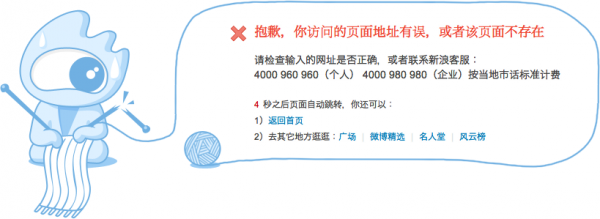A new government report shows a 9% drop last year in users of Sina Weibo and other Twitter-like services in China. From Paul Mozur at The Wall Street Journal:
According to a report released by the government established China Internet Network Information Center, total users of microblogs in China fell to 280.8 million in 2013 from 308.6 million in 2012, a trend which the center attributed to growing competition from social networks and messaging applications on smartphones.
The government has renewed a campaign to crack down on microblogs, which act like a virtual town square for many in China to voice their opinions about a range of issues from official corruption and environmental degradation to sports and pop stars. Beijing has long sought greater control over information distributed by microblogs, known as weibo in Chinese, and mandates that companies operating the sites closely monitor and censor content.
Though the report doesn’t bring up the campaign—which has led to the warning and arrest of high-profile commentators and the expansion of criminal laws that make it easier to prosecute people for their online activity—many analysts have warned the crackdown would damp the use of microblogs. [Source]
The new figures—which Sina has questioned—come amid complaints that Sina Weibo is being overrun by government mouthpieces, fake “zombie” accounts, and intrusive ads, on top of more intense censorship. Meanwhile, Mozur notes, a shift from public weibo to the semi-private Weixin, or WeChat, has hastened the slide. The Economist reports that WeChat appears to hold advantages for both the censors and the censored, including investigative journalist Luo Changping.
By the end of 2013 a propaganda official boasted that the authorities had successfully “cleaned” the internet. Some public intellectuals have given up their microblog accounts. One described the internet and microblogs as being in a “vegetative state”.
[…] But discussion on the internet is not in a vegetative state so much as it is migrating and mutating. WeChat represents the new field of battle online, and official voices have been quicker to adapt to it than they were to weibo, whose rapid rise from 2009 caught them by surprise. Many state-run media already have WeChat accounts. Still, independent voices find that, since WeChat networks are more private than weibo, their interactions are more fragmented and personal, but also less subject to scrutiny and censorship because their reach is less broad. (Unlike microblogs, WeChat does not disclose how many subscribe to individual public accounts.)
[…] But the lack of transparency on WeChat presents a different challenge to the authorities from that posed by weibo. When a rumour starts on weibo, it can be stopped on a public platform, says Mr Luo. When grumblings develop on WeChat, they are more likely to fester quietly for longer. If a rumour is spreading, there is no public platform to refute it, he says. “I think if something really happens, WeChat would do a lot more damage than weibo.” [Source]
A second article in this week’s edition looks at Tencent’s unusual success in monetizing the platform. See more on the rise of WeChat at Global Voices Advocacy earlier this month.
At Foreign Policy, Sue-Lin Wong highlights another alternative venue for online discussion, the relatively small but rapidly growing Zhihu.com:
[…] Meaning ‘do you know’ in Chinese, Zhihu is an interactive, online platform similar to Quora.com where anyone can post questions, with the best responses upvoted by others. Featuring high-profile Chinese entrepreneurs and public intellectuals among its users, Zhihu is increasingly providing Chinese netizens with a space for rich discussion, one surprisingly free — at least for now — from government censorship.
[…] Zhihu provides a home for the discussions that were never allowed in China’s state education system. Taiwanese and Mainland Chinese debate the hypothetical political processes required for reunification; other users sophisticated arguments about the fraught relations between Chinese ethnic minorities and the Han, who make up roughly 92 percent of the population. Some of the repartee that results from sensitive topics can be both humorous and tragic. One commenter asked about the most common way for intellectuals to commit suicide during the anarchic, decade-long Cultural Revolution; another responded, “Tell the truth.” “Do Taiwanese generally dislike Taiwanese President Ma Ying-jeou, and if so, why,” was a popular question — and one of the most popular answers was yes, “because they can” in Taiwan’s democratic society. [Source]








